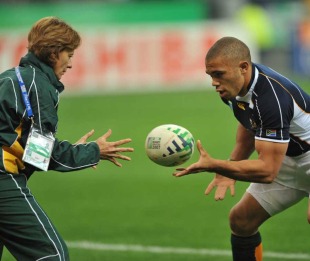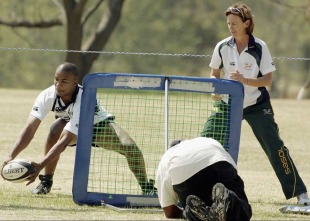|
Rugby World Cup Countdown
Sherylle Calder - gun for hire
Graham Jenkins
November 5, 2010

Calder works with Springboks speedster Bryan Habana during their march to the Rugby World Cup crown in 2007
© Getty Images
Enlarge
The build-up to next year's Rugby World Cup is set to intensify in the next few weeks with the sport's giants set to go head-to-head in the end of year internationals. The high profile inter-hemisphere clashes will offer the clearest hint yet as to who is most likely to lift the Webb Ellis Cup in a little over a year's time but every one of them should be wary of one key player who has yet to enter the fray. Dr Sherylle Calder is the only person in the history of the game who can boast back-to-back Rugby World Cup victories - having helped steer England to glory in 2003 before playing her part in South Africa's triumph four years later. And what made her so indispensable to Sir Clive Woodward and Jake White? Visual motor performance. Welcome to her world. Put simply, Calder's expertise centres on a player's all-round vision, his ability to process that information and react accordingly. It is a calling card that has won her a legion of admirers, and more importantly believers, across the sporting world, Her disciples include some of the leading teams and personalities from football, cricket, golf, motor racing, tennis and hockey, among others. But it is her work in rugby union that marks her out as a pioneer who could yet have a say in the destination of the 2011 Rugby World Cup crown. "Just like any other coach we are constantly trying to raise a player's skill level," Calder explained to ESPNscrum on a recent trip to London. "If we can help them make a better decision based on what they can see and process and respond to that information faster then we think we can create better players." A former South African hockey international, Calder's fascination with the visual side of sports performance has its origins in her playing days. "When I used to play people would often ask, 'do you have eyes in the back of your head?' Or, 'how did you do that?' And, 'how did you see that?'. I eventually realised that I did have a skill that not everyone had and when I stopped playing I decided I would explore it further." For Calder that meant extensive research in conjunction with the Sports Science Institute of South Africa - her professional home ever since. "We were convinced we had discovered a missing link," added an enthusiastic Calder, who fights a daily battle to convince doubters that the eye-to-hand relationship is not merely a God-given talent but a skill that can be coached, trained and therefore improved. "We had a really interesting day at the Leaders in Performance conference. One of the coaches there said that he thought it was not trainable and I told him that it absolutely is - and we have the research to prove it." That meeting was followed by another with an old friend - England manager Martin Johnson, who captained his country to World Cup glory in 2003. "I happened to speak to Martin because he was there as well," she said, haiving played down the possibility of a return to the England set-up. "Having obviously worked with him before he said the greatest thing for him was going onto the field with an increased awareness of space made a huge difference to his game. "Sadly I'm not in contact with any of the England guys anymore since moving back here to South Africa and I wasn't allowed to work with any of them once I began working with South Africa. But I remember Will Greenwood always used to joke that I didn't just help his rugby skills but his golf game too!"
Woodward was quick to latch onto Calder's services, having learned of her work with the Australian cricket team and also the All Blacks, and it was no surprise that her home nation came calling in the wake of England's triumph - but what exactly does here coaching entail? "I created my own software program that the players would use on a regular basis as part of their training routine," she said. "We train as a group but I work with every player individually. Every player is different to the next guy. You've got to know the science, you've got to know the sport and the pure acquisition to be able to summarise what the player needs and it is difference for every guy. "And I would also work with individual players out on the field - guys like Jean de Villiers and Bryan Habana - where we would train them to intercept passes." The result was stunning in the case of that Springbok duo, with the pair subsequently carving reputations as two of the most devastating game-breakers in world rugby. "Those interceptions didn't just happen by chance," stressed Calder. "We worked specifically on that part of the game. If you can make the eye quicker, focus quicker you can read the game quicker and make sure you are in the right place at the right time. "There is a clear correlation between what you do on the field and the strength of your visual skills. So by watching a guy train I can immediately tell you what kind of training he needs. People have always thought that it is a skill you are born with but we have always thought it is trainable." Success in top flight sport does not guarantee security and a new Springboks coach in the form of Peter De Villiers meant a change in direction. "A new coach comes in and they don't necessarily want to replicate what another coach has done, they want to bring their own ideas," she said. "You can't just train on the field because that has been done for years. It is not that which makes the difference. It is the identification of the individual requirements and then use of the programme that I have developed."

Calder works on a visual awarenes drill with Springbok JP Pietersen
© Getty Images
Enlarge
She adds that the science behind visual awareness is evolving all the time. "I learn every day, whether it is spending the day at a conference listening to other people talk, or working with athletes, I am always learning. I develop the system on a weekly basis. It is forever changing." Calder has no time to mourn the loss of international rugby as a client with a bulging diary, her Sports Institute commitments and a desire to inspire social change keeping her busy. "We work with all kinds of athletes - not just elite athletes," she added. "And we work with kids with the aim of improving their reading ability as well as their learning and a cognitive ability. "We don't use our eyes effectively anymore. A lot of kids spend their lives in doors watching TV and playing video games and on mobile phones so we need to find a way to harness those skills and our programme does just that." A proud sporting nation such as South Africa is unlikely to allow a talent such as Calder out of their grasp but that does not mean she has lowered her sights. "I always say that you use your eyes for everything so anyone could use my expertise," offers Calder. "As a result I have worked in everything from fly-fishing to sailing. People think you only need good visual skills for ball sports but you need it for all sports. Any sport could benefit." However, it would appear that her immediate future does not lie with the Springboks - despite a questionable lack of foresight on their part - although if they were to continue to labour she should perhaps expect a call. "I do have a few opportunities lined up that I can't really talk about at this time," she added before attempting to draw a line under her rugby days. "I have been very privileged to have worked with two very good teams and they were both fantastic to work with and it is very special to have those achievements to reflect upon." Rugby's loss, it appears, is the wider sporting world's gain. © ESPN Sports Media Ltd. Graham Jenkins is the Senior Editor of ESPNscrum.
| |||||||||||||||
Live Sports
Communication error please reload the page.
-
Football
-
Cricket
-
Rugby
-
- Days
- Hrs
- Mins
- Secs
F1 - Abu Dhabi GP
Abu Dhabi Grand Prix December 11-131. Max Verstappen ()
2. Valtteri Bottas (Mercedes)
3. Lewis Hamilton (Mercedes)
4. Alexander Albon ()
5. Lando Norris ()
6. Carlos Sainz Jr ()
-
ESPNOtherLive >>
Snooker - China Open
Tennis - Miami Open

